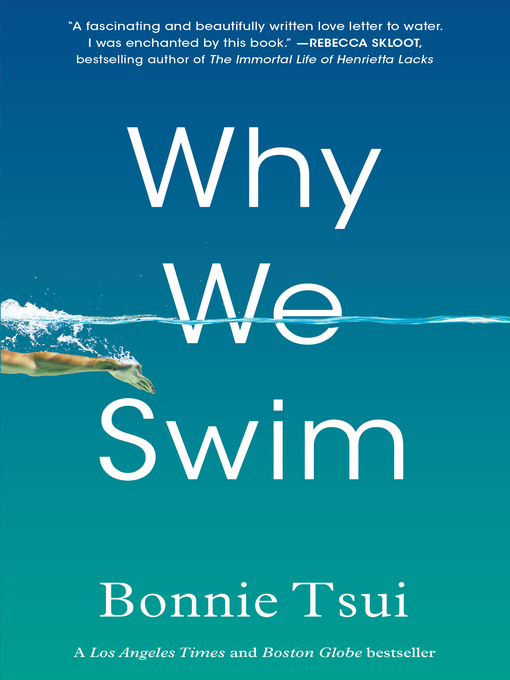
Why We Swim
کتاب های مرتبط
- اطلاعات
- نقد و بررسی
- دیدگاه کاربران
نقد و بررسی

January 13, 2020
Journalist Tsui (American Chinatown) opens her eclectic, well-crafted survey with a fascinating story about an Icelandic fisherman who swam six kilometers in 41 degree water after his boat capsized. He survived thanks to a “biological quirk”—an unusually thick layer of body fat, more comparable to a seal’s than to the average human’s. From this starting point, Tsui looks at five different reasons swimming is important to humans, dedicating a section to each: survival, well-being, community, competition, and “flow” (the pursuit of the sublime). Characters like the opening chapter’s “real-life selkie”—a folkloric creature halfway between a human and a seal—and marathon swimmer Kim Chambers, who took up the sport after almost losing a leg to injury, appear throughout, along with scientific facts, personal stories, and social history. Tsui shares her own history as a swimmer, and swimming’s place in her family history—her parents’ Hollywood-worthy first meeting was at a Hong Kong swimming pool in 1968, she a “bikini-clad beauty,” he a “bronzed lifeguard.” In a chapter about the mindset of champion swimmers, she writes, “The view from within is what I’m after.” Her overarching question is about “our human relationship to water” and “how immersion can open our imaginations.” Readers will enjoy getting to know the people and the facts presented in this fascinating book.

February 1, 2020
A study of swimming as sport, survival method, basis for community, and route to physical and mental well-being. For Bay Area writer Tsui (American Chinatown: A People's History of Five Neighborhoods, 2009), swimming is in her blood. As she recounts, her parents met in a Hong Kong swimming pool, and she often visited the beach as a child and competed on a swim team in high school. Midway through the engaging narrative, the author explains how she rejoined the team at age 40, just as her 6-year-old was signing up for the first time. Chronicling her interviews with scientists and swimmers alike, Tsui notes the many health benefits of swimming, some of which are mental. Swimmers often achieve the "flow" state and get their best ideas while in the water. Her travels took her from the California coast, where she dove for abalone and swam from Alcatraz back to San Francisco, to Tokyo, where she heard about the "samurai swimming" martial arts tradition. In Iceland, she met Guðlaugur FriðÞórsson, a local celebrity who, in 1984, survived six hours in a winter sea after his fishing vessel capsized, earning him the nickname "the human seal." Although humans are generally adapted to life on land, the author discovered that some have extra advantages in the water. The Bajau people of Indonesia, for instance, can do 10-minute free dives while hunting because their spleens are 50% larger than average. For most, though, it's simply a matter of practice. Tsui discussed swimming with Dara Torres, who became the oldest Olympic swimmer at age 41, and swam with Kim Chambers, one of the few people to complete the daunting Oceans Seven marathon swim challenge. Drawing on personal experience, history, biology, and social science, the author conveys the appeal of "an unflinching giving-over to an element" and makes a convincing case for broader access to swimming education (372,000 people still drown annually). An absorbing, wide-ranging story of humans' relationship with the water.
COPYRIGHT(2020) Kirkus Reviews, ALL RIGHTS RESERVED.

April 1, 2020
With lyrical and descriptive writing, Tsui (American Chinatown) shares different stories about our relationship with water, beginning with her own experiences swimming in the Bay Area. The book is similar to a collection of essays, wherein Tsui shares stories about others and intertwines her own voice, including recollections about going to the beach while growing up in New York. The author writes about a wide range of topics, including the history of humans swimming, from early times to the success of marathon open-water swimmer Kimberley Chambers and even a Baghdad swim club that uses Saddam Hussein's palace pool. Throughout, Tsui references literature, history, and science without overwhelming readers, who will walk away from the book learning an incredible amount of information, yet in an easy-to-digest way. VERDICT Tsui's beautifully written book will appeal to a wider audience beyond sports fans. Readers who are also interested in science and nature will appreciate this highly recommended narrative work about a therapeutic sport.--Pamela Calfo, Bridgeville P.L., PA
Copyright 2020 Library Journal, LLC Used with permission.

Starred review from February 15, 2020
In this eloquent exploration of the human relationship to water, Tsui examines the universal experience of being immersed in water, whether it's in an ocean, lake, or swimming pool. The narrative is divided into five topics: survival, well-being, community, competition, and flow. A lifelong swimmer, Tsui deftly moves from one topic to another, weaving in her personal experiences, which include embracing open-water swimming (sans wet suit) in the frigid waters of San Francisco Bay and swimming across Lake George in upstate New York, the latter to kick off her wedding celebration. Fascinating highlights include the gripping story of an Icelandic fisherman who survives a winter shipwreck, plunging into 45-degree water and enduring a 6-kilometer swim to shore, and the story of a swimming coach who gave lessons in Saddam Hussein's palace pool. Tsui travels to Japan to learn firsthand about Nihon Eiho, also known as samurai swimming (yes, you swim in a full suit of armor). Trailblazers featured include Charlotte Eppie Epstein, who founded the Women's Swimming Association in 1917; legendary open-water swimmer Lynne Cox; five-time Olympian Dara Torres; and the most decorated male swimmer in history, Michael Phelps. This fascinating look at the positive impact swimming has had on our lives throughout history might leave most readers eager to get back in the water as soon as possible.(Reprinted with permission of Booklist, copyright 2020, American Library Association.)

























دیدگاه کاربران